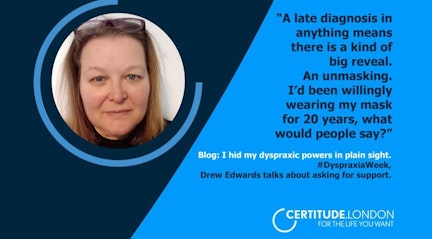I hid my dyspraxic powers in plain sight
-
Blogs

I was 30 years old when I was diagnosed with Dyspraxia. I’d always hated writing by hand. I found it painful and became an early adopter of computers. However, there was always a disconnect between what I thought I was typing and what came out on the page. Spell checker has long been my friend.
When joining Certitude I disclosed my disability, but when asked what I needed, I said I was fine. In fact, saying ‘I’m fine’ is something that I’ve been doing for a long time.
I’d grown up a “clumsy child”. The uncoordinated one in a very sporty family, unable to run or throw in a straight line. “Life is hard” I was told – “just learn to adapt”. I played to my strengths and took up throwing in circles instead, becoming the county champion for discus and later in adulthood, the hammer. I went to art college and took up design instead of writing. Using my listening and empathy skills to understand how to communicate in different ways. I adapted and learnt coping strategies. When I fell, physically or metaphorically, I got up and laughed it off – just another funny story to tell.
So why the late diagnosis?
After having two young children, I was back in education doing a degree and required to prove that I needed to use a computer for my exams. I was referred to the educational psychologist for assessment. I only really saw the diagnosis as a means to an end. I was prescribed additional time, access to a PC and given a leaflet. Finishing my degree, I went on with my life. Albeit with a slightly better understanding of why I’d struggled to learn the piano, or failed my French O level twice, and why I never mastered the art of reverse parking.
Throughout my 30s and 40s, I didn’t really pay it any attention. My focus was on caring for my neurodivergent children whilst juggling a career as a marketer. I got used to organisations saying that they were supportive of people with disabilities, but not really walking the talk. Colleagues could be dismissive of unseen disabilities. I played down my reliance on technology to do my job. Shrugging off the prejudice that people working in communications and marketing should ALL be excellent at spelling and grammar. Instead, I focussed on the things I was good at. My empathy and listening skills allowed me to interview people with ease, write stories and blogs and understand people’s behaviours. Using technology as my virtual personal assistant, I hid my dyspraxic powers in plain sight.
And then my body started to betray me.
Like many people approaching their 50s I found that my body no longer did the things I’d come to rely on it to do. Whilst I’d gotten used to my frequent falls, suddenly they weren’t as easy to brush off and recover from. I found I needed more time to process information and organise myself. And my body memory, which had helped me to navigate repetitive tasks like driving or typing had become more easily affected by the slightest changes in environment. My keyboard could be different or positioned a millimetre off and I would spell every word wrong, hitting all the wrong keys.
Perhaps it was time to explain to my work colleagues, family, and friends – these difficulties were more than the sum of my funny anecdotes.
I’ve since learned that I am not alone in avoiding talking about having an unseen disability. Dyspraxia affects around 5% of our population and women are often older before their difficulties are identified. Having a late diagnosis in anything means there is a kind of big reveal. An unmasking. I’d been willingly wearing my mask for 20 years, what would people say? I was worried that people would treat me differently, especially at work. Could I trust them to be supportive? The truth is, some were, some weren’t. But things really improved when I joined Certitude.
Asking for support
Luckily for me, despite always saying ‘I’m fine’, my manager didn’t just take me at my word. Instead at each 1-1 and catch up, they gently continued to ask if I needed anything. After encouragement from colleagues in our Disability Network, I learnt that it really would be ok to talk about it and ask for the support that I needed. This led to honest conversations about reasonable adjustments and the right IT equipment. I could be open with colleagues about being in pain when I’d had a fall or needed help with travel.
Support is so much more than a policy or set of guidelines. It’s also about trust and having the right attitude. Dyspraxia is different for everyone. I’ve learnt that it’s OK to ask for support and my needs may change throughout my life. Knowing I have the support of my manager and colleagues has made all the difference to how I feel at work. That in turn has made all the difference to the person I am when I finish work. It’s given me confidence to be more open with my family and friends. My mask is off, and it really is OK to just be me.
Drew Edwards is the External Marketing and Communications Manager at Certitude.